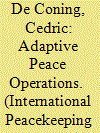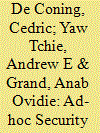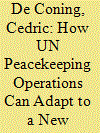| Srl | Item |
| 1 |
ID:
174334


|
|
|
|
|
| Summary/Abstract |
Complexity theory offers a theoretical framework for analysing how social systems prevent, manage and recover from violent conflict. Insights from complexity suggest that for a peace process to become self-sustainable, resilient social institutions need to emerge from within, i.e. from the culture, history and socio-economic context of the relevant society. Peace operations are deployed to contain violence and to facilitate this process, but if they interfere too much, they will cause harm by inadvertently disrupting the very feedback loops critical for self-organization to emerge and to be sustained. To navigate this dilemma, the paper proposes employing an adaptive approach, where peace operations, together with the communities and people affected by the conflict, actively engage in an iterative process of inductive learning and adaptation. Adaptive Peace Operations is a normative and functional approach to peace operations that is aimed at navigating the complexity inherent in trying to nudge societal change processes towards sustaining peace, without causing harm.
|
|
|
|
|
|
|
|
|
|
|
|
|
|
|
|
| 2 |
ID:
189281


|
|
|
|
|
| Summary/Abstract |
This article contends that Ad-hoc Security Initiatives (ASI) have developed over the last decade in the Sahel and Lake Chad Basin and represents a new form of African collective security mechanism. The G5 Sahel Force and the Multi-National Joint Task Force emerged from a context-specific need for small clusters of African states to respond collectively to a shared cross-border security threat(s). The existing African Peace and Security Architecture (APSA) mechanisms were not specific and responsive enough to meet this emerging need. Despite substantial investments over the last twenty years by the African Union, Regional Economic Community/ Regional Mechanisms and international partners to establish the African Standby Force, this instrument was not agile enough to respond to the type of threats experienced in the greater Sahel region. In this article, we trace the emergence of a new type of ASI, examine how they fill an essential gap and analyse why the African Standby Force was not able to meet this need. We then consider the implications of these developments for the future of the APSA and how closer collaboration between ASIs and APSA can be developed.
|
|
|
|
|
|
|
|
|
|
|
|
|
|
|
|
| 3 |
ID:
169237


|
|
|